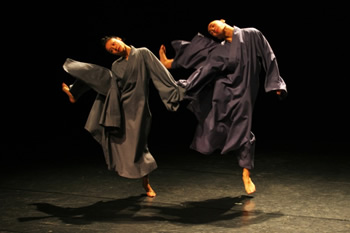Some great literary works defy adaptation to a visual medium. When we read, say, The Great Gatsby, we do so less for F. Scott Fitzgerald’s plot than the pleasure we take in savoring the sheer constructive perfection of his sentences — his voice, his point of view, his observations — his style. The how, as opposed to the what.
Film, a medium dependent on action more than words, can only simplify. For a theater dedicated to the staging of literature, the problems are both easier and more demanding. In a fluid adaptation, not as concerned as a movie would be with formal realism, the prose itself can (should?) be what matters most. It’s the integration of narrative and dialogue — the theatrical style — which lays the largest traps for the adaptor.
Derek Goldman’s adaptation of The Turn of the Screw for StreetSigns Center for Literature and Performance, currently playing in Studio 6 Theatre, Swain Hall on the UNC-Chapel Hill campus, is a case in point. The willful ambiguities that Henry James leavened into his controversial novella are ripe for theatrical exploration. That the piece was written as first-person narration, however, proves insurmountable for its theatrical curator.
A very good actor called Kate Fry is called upon both to enact the character of James’ unnamed governess, driven to hysteria by the notion that malevolent spirits seek to harm her “innocent” young charges, and to relay what the young woman is thinking, feeling, and observing throughout. The conceit requires Fry to leap from narration to speech and back again throughout; that it ultimately defeats her is a fault not of performance, but conception. Since I’m a playwright myself, I hesitate to make suggestions to another dramatist, but it does seem to me there may be less schizophrenic ways of accomplishing the task.
While Goldman’s adaptation admirably captures the sense, sound, and weight of James’ inimitable (if somewhat wearying) style, the sheer verbosity of the narration mitigates the emotional turmoil the governess experiences. These wrenching narrative interludes cancel out her mounting anxiety; they don’t build terror, merely suspend it. A curious self-deflation of dramatic effect, they stop the action cold. A charged exchange of stares surrenders its power to move us when one of the actors involved tells us we’re watching a charged exchange of stares.
Goldman has also cut too deeply at the story’s preface (elucidated exceptionally well by Jordan Smith), making some aspects of the governess’ situation confusing to those who haven’t read the novella. Her references to Harley Street (where she gained employment from the children’s absent uncle) will puzzle the uninitiated, as will the sudden presence of the girl child Flora in the governess’ bed. Goldman also, unaccountably, gives some of the unseen master’s lines to Mrs. Grose (Elisabeth Lewis Corley), the housekeeper of the estate at Bly, out of whose mouth they make no sense. Since we do not hear of the uncle’s instructions to never write to him for instruction, those unfamiliar with James may not fully comprehend the extremity of the governess’ isolation.
Occasionally employed to cunning effect, much of Rob Hamilton’s mobile set is too bulky and cumbersome for the small playing area, and Goldman relies on it to intrusive effect. A massive doorway is moved in front of the actors during a crucial dialogue sequence between the governess and Mrs. Grose, on opposite sides of the stage, only to be rolled back again once the characters have quit the house for the outdoors. Effective lighting could accomplish so much more, with so much less effort.
The appearances of the ghosts, however, are beautifully conveyed. The disreputable Peter Quint (Chris Chiron) first shows himself as a projection on high with clouds moving slowly behind and, ghostlike, over his features; the enigmatic Miss Jessel (Meaghann Lynne) is first seen as an indistinct image — a reflection glimpsed under the rippling water of a lake.
Elisabeth Lewis Corley is a splendid Mrs. Grose, the tatters of her natural jollity barely able to conceal some terrible, shattering, knowledge she never fully shares. Kate Fry is eerily adept at limning the governess’ extremes. She makes us feel, and believe, the way the character’s unhealthy idolization of the children turns her toward obsession, paranoia, and a desperation that may be the beginnings of madness. Because they automatically have less experience than adults do, in life or on stage, I normally prefer not to single children out for criticism. However, the role of the boy Miles is a crucial one, and young Charlie Harris lacks the technique to vary his performance; we never sense in him what the governess does.
In his program notes, Goldman remarks on the story’s openness to many interpretations, including as “a tale of homosexual abuse.” The term he’s looking for is pedophilia, which has as little to do with homosexuality as pigs have with aviation. Is the director somehow referring to the unlikely possibility that Peter Quint raped Bly’s owner — or vice versa? If not, his statement is patently offensive.
The StreetSigns Center for Literature and Performance, in partnership with the UNC-Chapel Hill Department of Communication Studies, presents The Turn of the Screw Wednesday-Saturday, Jan. 29-Feb. 1, at 8 p.m.; and Sunday, Feb. 2, at 2 p.m. in Swain Hall Studio 6 Theatre on the UNC-Chapel Hill campus. $14 Friday and Saturday and $12 Wednesday, Thursday, and Sunday. 919/843-3865 (student rush, senior citizen’s discounts, and group rates available). http://www.streetsigns.org/.
& 2/1/03 FEEDBACK – Letter Concerning Scott Ross’ Review of The Turn of the Screw.
Dear Editor:
I have never responded directly to a review before, positive or negative, but there are so many inaccuracies in [Scott Ross’ review of “The Turn of the Screw” in Part 1 of the January 30th edition of ROBERT’S REVIEWS] that I felt compelled to point a few of them out. Literally every one of the things you mention as confusing are based on an inaccurate reading (or memory?) of the text itself. For example, your review states “Goldman also, unaccountably, gives some of the unseen master’s lines to Mrs. Gorse (the character’s name is misspelled every time her name appears in the review) (Elizabeth Lewis Corley) (the actress’ name is misspelled each time it appears in the review), the housekeeper of the estate at Bly, out of whose mouth they make no sense.” [EDITOR’S NOTE: Both these misspellings were corrected in final e-mail edition and the subsequent online edition of this issue of Robert’s Reviews.]
In fact, the unseen master has no “lines” in the novella, and never appears. Every word Mrs. Grose says in the play is a direct quote from her dialogue in the novella. Perhaps you were remembering the liberties taken with this in the film “The Innocents” where the uncle is actually characterized (as played by Michael Redgrave)?
In the same paragraph, you say the audience will be confused by the sudden appearance of Flora in the governess’ bed, but there are no scenes in the novella or the adaptation in the governess’ bed. [The governess] walks in on Flora in Flora’s bedroom. (The doll she finds on Flora’s bed might serve as an additional hint to their location.)
Perhaps most troubling of all, is your implication that I am unfamiliar with the term pedophilia and that my director’s note is somehow homophobic, something I take particularly seriously as a professor, scholar, and activist in areas of queer and gender studies, etc. The use of the term homosexual abuse in a long catalogue of terms that describe the complex, contradictory critical history of the text (none of which the Director’s Note advocates or suggests as interpretations of our staging) reflects the dozens of critical essays during the 20th century that employed this term and used it as a window into analyses of James’ own repressed homosexuality, his fears, etc. (See essays by Edmund Wilson, Harold Goddard, Oscar Cargill, and others). Again, the Director’s Note makes quite clear that I am not advocating any of these terms or approaches, but I certainly feel I have the right to report on this critical history without being implicitly labeled ignorant or homophobic.
In our small community, I am grateful for all coverage of our work, even negative, but did feel the need to point out a few of the many errors in this review.
Derek Goldman
Artistic Director
StreetSigns Center for Literature and Performance
Chapel Hill, North Carolina
Assistant Professor
Department of Communication Studies/Performance Studies
University of North Carolina at Chapel Hill












